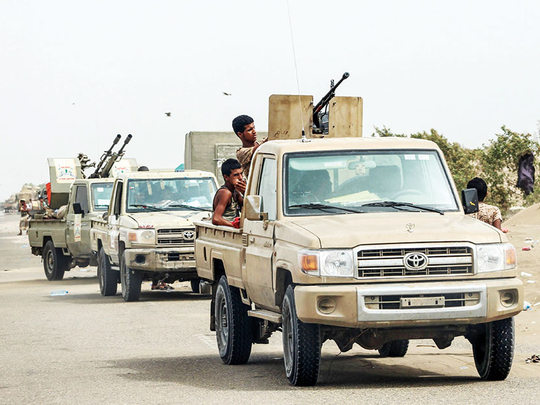
The alliance led by Saudi Arabia and the United Arab Emirates launched its assault on the heavily defended Red Sea city on June 12 to try to weaken Al Houthis by cutting off a key supply line for the group which controls the capital Sana’a and most populated areas.
“There is a heavy deployment of armed Al Houthis in the city and new check points have been set up in neighbourhoods where there are supporters of the Tehama brigades,” said one resident, referring to a Yemeni faction from the Red Sea coastal plain that is fighting with coalition forces.
Fierce clashes broke out after midnight near Hodeida University, around 3 km west of the city centre, on the coastal road linking the airport to the port, added the resident, who requested anonymity.
Coalition forces seized the airport on Wednesday and have been consolidating their hold in the area as UN efforts continued to reach a political deal that would avert an assault on the port, a lifeline for millions of Yemenis.
Al Houthi militants on Friday indicated that in Yemen could be they would be willing to hand over management of Hodeida port to the UN, a potential breakthrough in the three-year conflict, according to Reuters sources.
The about face is indication that the group may finally be caving in under the massive pressure of the ongoing offensive.
The Saudi-led Arab coalition has long called for Al Houthis to hand over control of the port city to the UN, which they rejected many times.
But a recent flash offensive on the port city has tipped the scales in favour of the coalition where Al Houthis have sustained major losses.
Since then, the coalition has said that the port should be handed over to the Yemeni government and not the UN.
By accepting the offer to hand over the port to the UN, Al Houthis are finding themselves in an increasingly weakened position.
Saudi Arabia’s UN ambassador, Abdullah Al Mouallimi, reiterated the coalition’s demand that Al Houthis quit the city entirely.
“On the ground, what we are offering is for the Houthis to hand over their weapons to the government of Yemen and to leave, to leave peacefully and to provide information about the locations of the mines and improvised explosive devices and so forth,” Mouallimi said on Friday.
The recapture of Yemen’s port city of Hodeida from Iran-allied Al Houthis is crucial for safe international navigation in the region.
“The liberation of Hodeida will secure navigation in the international waterways,” Col. Turki Al Maliki, a coalition spokesman, said over the weekend.
“It will stop the danger of attacking international ships.”
Al Houthis have been in control of Hodeida in western Yemen since their late 2014 coup against the internationally-recognised government.
The militants have repeatedly threatened to attack oil tankers using Bab Al Mandab, a major waterway between the Arabian Peninsula and Africa, linking the Red Sea with the Gulf of Aden and the Suez Canal.
On Wednesday, the Arab Coalition confirmed seizing full control of the Hodeida airport, dealing a major blow to Al Houthis.
The facility lies around 10 kilometres from the city’s vital harbour, which is the government forces’ next target.
The Coalition accuses Al Houthis of taking advantage of their control of Hodeida port to obtain weapons from their Iranian patrons as well as confiscate aid intended for Yemenis in order to sustain their war efforts.
Al Turki on Friday said that retaking the harbour will come to benefit Yemenis.
“The liberation of the Hodeida port will cut off the vital artery for Al Houthis’ armament and guarantee availability of financial resources to the legitimate government,” he added.
Hodeida is strategically important because its harbour is considered a lifeline for millions of Yemenis, as most of the commercial imports and relief supplies enter through it to the country.
The Saudi-led alliance launched last week a massive offensive dubbed “Golden Victory” aimed at driving Al Houthis out of the Red Sea city of around 600,000 people.
“The liberation of Hodeida will reflect positively on all Yemenis and stop the illegal tax levies [by Al Houthis],” Al Turki said.
He accused the militants of holding themselves up inside inhabitants’ houses and taking them as human shields in the city.
After their takeover of the city’s airport, the government forces, supported by the Arab Coalition, are bracing up for a major battle to regain the Hodeida harbour.
A Yemeni army official said in remarks published on Friday that a blitz attack is being considered to clear Hodeida of Al Houthis.
“The army and resistance forces are fully prepared to liberate Hodeida,” Col. Adnan Al Matri, the head of the Western Coast Operations Room, told pan-Arab newspaper Asharq Al Awsat.
He added that concerns for civilians’ safety slow down the militants’ expulsion from the city.
“Al Houthis militias deliberately use civilians as human shields and residential areas as military positions,” he added. “They have started digging tunnels and trenches in populous areas as well as positioning snipers at residential hilltops.”
In 2015, Saudi Arabia and allies, mainly the United Arab Emirates, unleashed a military campaign in Yemen after Al Houthis advanced on the southern city of Aden, the temporary seat of the internationally recognized government, after the militants overran the capital Sana’a months earlier.












